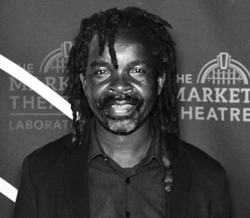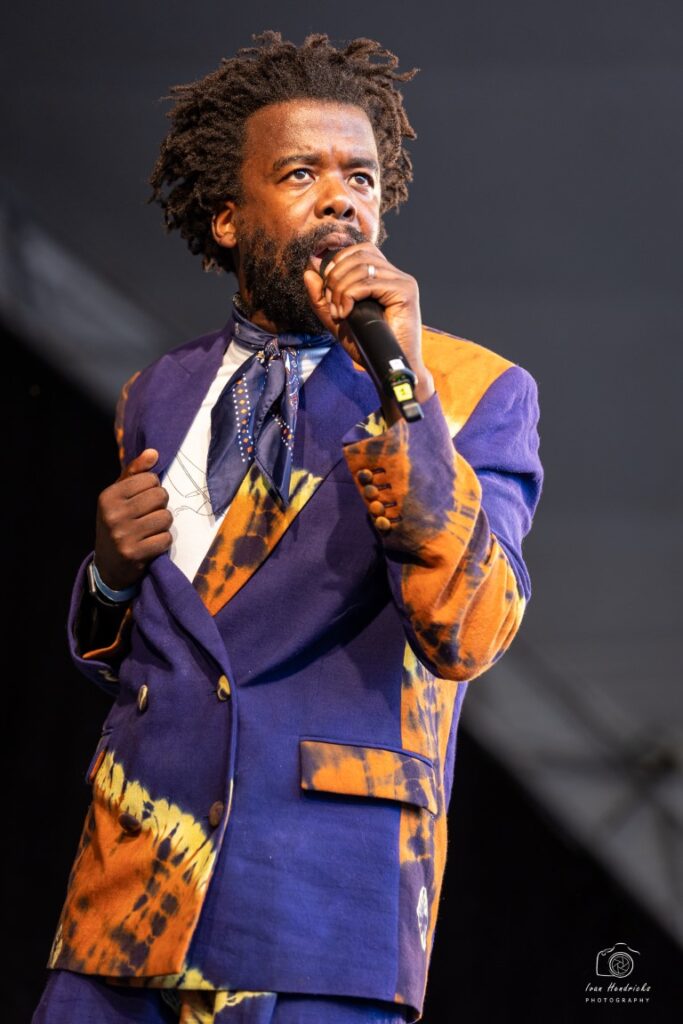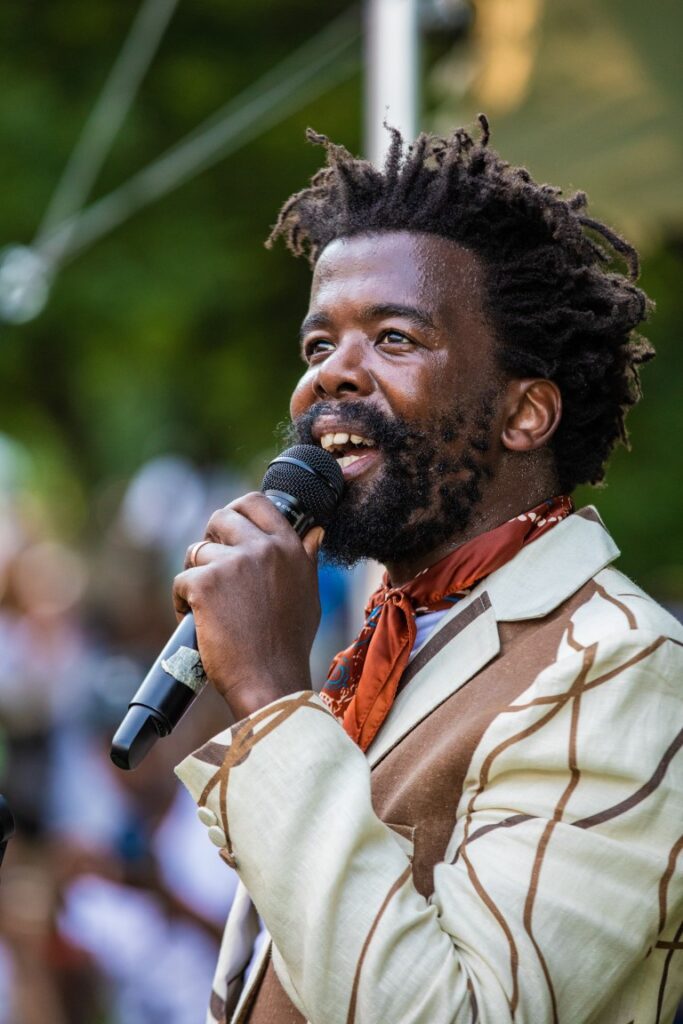Mandisi at the fore front of decolonising the curriculum through creating Afrocentric sound
He is billed to perform at the Joy of jazz festival September 26-28 at Sandton Convention Centre
By Edward Tsumele, CITYLIFE/ARTS Editor

She found me watching Zonke while in the Media Lounge my eyes glued onto the stage. Her performance as usual, was outstanding. My appreciation of this particular performance was accentuated obviously by the fact that I had not attended her shows in recent years. And so like many others that have come to appreciate her performance since the gifted vocalist burst onto the local music scene in the 2000s, I was pretty much enjoying her show, concentrating my attention on what was happening on stage while of course dancing. But that was disturbed when she arrived and spoke.

“Have you seen Mandisi,” she said. “No, I have not,” I responded quite irritated by my friend, a fellow journalist. “But why? Who is he anyway?” “Man, you have missed out. He is the best thing that has ever happened on the South African local music scene in recent years, for many years even.” And so, that sealed the deal. Subsequently I attended a festival where Mandisi was featured, and indeed Mandisi Dyantyis is a breath of fresh air on the contemporary African music scene. His singing is great, and his repertoire defies definition, other than saying it is an Afrocentric sound, partly folklore-ish and partly jazz and traditional music fusion that exudes energy and has the effect of lifting a listener or those watching him on stage into another level of cultural consciousness.
And so when a PR firm invited me to interview him a few weeks ago, I obliged. Even looked forward to the interview. It is then that I found myself seated with Mandisi in a posh Rosebank restaurant to talk about his music, his career and what influences his genre.
However I made the fatal mistake of associating him with a then forthcoming folklore music festival. I said it flippantly as a small talk for two people that had not met before. The man was not impressed, for his mind was on one show, and that is the Joy of Jazz where he was booked two years ago, where my friend disturbed my concentration and enjoyment of Zonke’s performance. This is because he is back there this year, and his focus at that very moment was the Joy of Jazz, and not a folklore music festival that he did not know of, let alone being featured.
I apologized for the small talk mistake. First he appeared unimpressed. A moment of awkwardness between me, Mandisi and the PR lady permeated the air around the table where we were seated. There was discomfort at the table. I hesitated, but then spoke. “My apologies again, perhaps let us reschedule the interview as it is always best to speak to an artist when they are comfortable and are in good space. In fact I prefer it that way,” I stated. The last part of my suggestion was actually true because as journalists we get to get the best from an artist in an interview when they are not agitated, but relaxed and are in a chatting mood. But as to the idea of rescheduling, that I am not sure whether I was actually prepared to do so, as I was actually tired that week having been attending events after events. I also did not want to speak to an artist, who was rightly agitated because of the mistake I made genuinely. Talk of not properly being briefed in a city that is always fast paced and in the process small but essential details get lost.
And so I was pretty relieved when the PR lady intervened and insisted that the interview must go ahead. It is then that the interview resumed earnestly, and I got to get to know about the artist. In fact by the time the interview wound up, we were talking like friends that had known each other for a long time. We were cool with each other. Mistake forgiven. What a relief!

It turns out Mandisi is one of a few but increasing crop of mainly young black musicians in post apartheid South Africa who have grabbed on opportunities to learn music formally at elite universities. In this case University of Cape Town’s College of Music. These are artists who after immersing themselves in music curricular that are steeped deeply in classical Western music theory for years at university, when they graduate they then go back into their cultural roots and mine the music within their cultural traditions and share it with the public. The reception becomes spectacular.
These are artists who have learned all the music theories within a Western music cultural tradition, but in practice after graduating, detach their practice from their Western classical music base and tap into their African cultural roots to create a sophisticated sound that is not quite jazz, but jazz influenced still, creating a hybrid sound of African traditional music fused with jazz standard influences, creating a complex but enjoyable sound that the South African music fans have over the year embraced.
“I would advise that young people if and when they have an opportunity to go to university and learn music, must grab those opportunities. Yes, in this country we have incredible musicians who have not gone to university to learn music. But this is simply because that never had such opportunities, particularly in the past. However I have seen such great people struggle to develop ideas around their music simply because they do not have a vocabulary for their ideas. Education helps to refine and develop ideas in music,” Mandisi said.
Besides Mandisi, others who, it can be argued here, have in their practice dehorned themselves from their classical Western music theory that they have learned at university in favour of digging deep into their African tradition to create a complex sound that is partly jazz and partly African traditional music include such names on the local music scene sas Selaelo Selota, Jimmy Dludlu, Nomfundo Xaluva Judith Sephuma and Budaza among others, who coincidentally like Mandisi are music graduates from UCT. What Mandisi and others have managed to do in a way is to decolonize what they have learned at university, creating a sound in their music practice that is informed by their own cultural traditions. During this interview Mandisi appeared to confirm this argument.
“My music, I would say, is influenced by the music that I grew up listening to at home,” Mandisi said during the interview. He holds a masters degree in music from UCT.
However you choose to define Mandisi’s genre, it is a sound that has found immediate connection with local music fans. They have embraced the sound whole-heartedly. For example, his recent concert at the Market Theatre was sold out. “Well, I will go and hang out at the foyer. Though it is sold out, I am going to take a chance and wait outside for an opportunity to get in,” a friend told me at the time of the concert. Mandisi’s music is increasingly finding traction globally also.
However what has emerged during this interview is the fact that Mandisi, although the rest of the country, and by extension the global music fans, have only gotten to know and appreciate his performances only in the past two years, the musician has been working hard around clubs in Cape Town, amassing a solid fan base in the past 20 years that he has lived in that city after leaving Port Elizabeth for studying at UCT.
“There were times when one would perform for a few people in clubs before growing to performing for 5000 people. Clearly some of the fans one grows up with them in their musical journey, while along the way you also get new fans,” he said.
Asked about what he thought about the growing influence of the home grown sound amapiano globally, Mandisi is full of praises for the people behind this sound.
“There we have something that is great, driven by local producers. It is so wonderful to see a local sound growing and influencing sound globally.”
Asked about his forthcoming performance at the Joy of Jazz at the Sandton Convention Centre September 26-28, where he will share the stage with top local and leading international stars, Mandisi revealed that he has new music to share with his fans.

“Of course I have created new music that I will present during my performance there as one has to keep on creating. I mean it has been two years since I last performed at the Joy of Jazz at the Sandton Convention Centre.”
As I packed my note book and stood up to leave, I also noticed that the hugely talented musician was no longer the man I spoke to immediately after the small matter of the folklore festival reference. We were indeed cool, as he said after my third apology.
Catch Mandisi Dyantyis at the Sandton Convention Centre 26-28 September 2024, the chances are you will be transported into a space where you will appreciate the power of Afrocentric sound performed by a talented musician.










